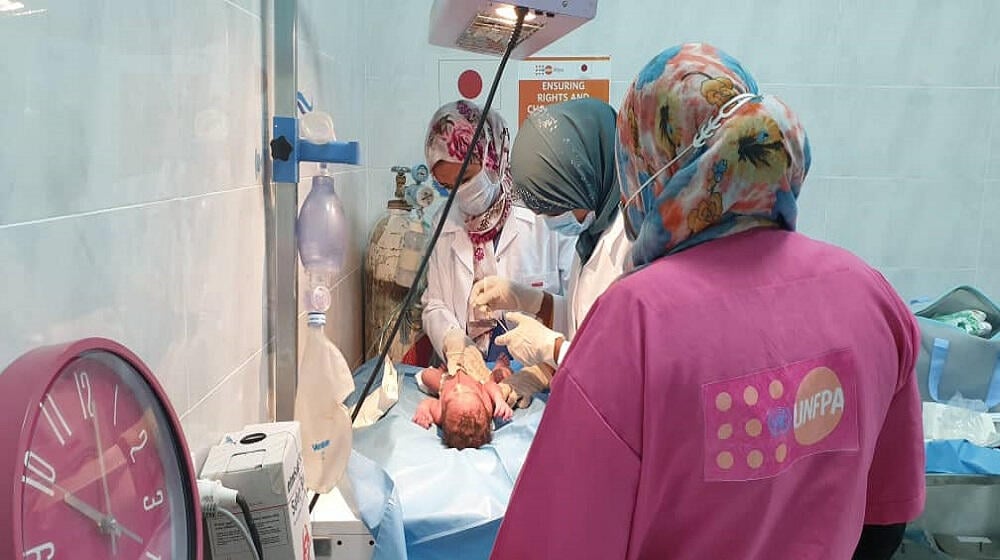GHAT, Libya – Rahma was delivering at home when complications arose: obstructed labour, internal bleeding and low haemoglobin levels.
The 18-year-old, a migrant from Niger, was rushed to a mobile health unit in Ghat, where after undergoing a Caesarean section and blood transfusion, she gave birth to a healthy baby boy she named Ahmed.
“I feared for the life of my child more than my own but thankfully we both were saved,” Rahma said. “The medical staff and facilities have been saving many lives especially from our migrant and refugee communities.”
Bolstering a challenged health system
Armed conflict, protracted instability and the COVID-19 pandemic have increased pressure on maternal and reproductive health services – already in short supply – disproportionately impacting the lives of women and girls. In remote areas like Ghat, in the western part of the country near the Algerian border, services are even harder to access.
Since 2018, UNFPA and its partners have deployed mobile health units throughout the country, consisting of a medical team leader, two specialized obstetricians/gynaecologists, two paediatricians, an anaesthesiologist, a general doctor and two midwives who work on a two-month rotation basis at various health facilities.
These teams provide essential maternal and newborn health services including basic and comprehensive obstetric and newborn care, family planning and medical case management for gender-based violence survivors, as well as general consultation and first aid.
“Our health system has relied heavily on foreign health workers in the past to ensure accessibility of health services including sexual and reproductive health,” said Fathi Abouras, deputy head of mobile medical convoys at the Ministry of Health. “However, political instability and the fragile security situation has caused a major dearth of manpower. UNFPA has provided tremendous support for expanding health coverage.”
Reaching more people with more services
Medical assistance through mobile health units and greater access to skilled birth attendants have helped reduce neonatal mortality rates in Libya in recent years.
In the past three years, more than 25,000 women and girls have benefited from sexual and reproductive health services and more than 100,000 households have been reached with sexual and reproductive health promotion and awareness activities. The European Union’s Africa Trust Fund is funding mobile health units in Tripoli, Sabha and Benghazi while the Government of Japan is supporting units in Ghat and Um-al-Araneb cities.
Amid the pandemic, UNFPA-supported health facilities have played a significant role in maintaining essential sexual, reproductive and maternal and mental health services, which are not available in almost 90 per cent of the primary health-care facilities in the country. The mobile health units are also providing awareness on COVID-19 and family planning services unavailable at other facilities.
“In 2021, over 10,000 people were reached through our health services. Still, more than 1.3 million people out of a total population of 6.9 million lack access to basic health care. A large proportion of health facilities are not functional or lack supplies or human resources. We need to scale up our efforts before the situation deteriorates further,” said Asr Toson, UNFPA’s representative in Libya. “We would request partners and donor institutions to come join hands with us in our pursuit to achieve a safer future for Libya and its people."
For more:
Salman Khalid
Email: ksalman@unfpa.org


